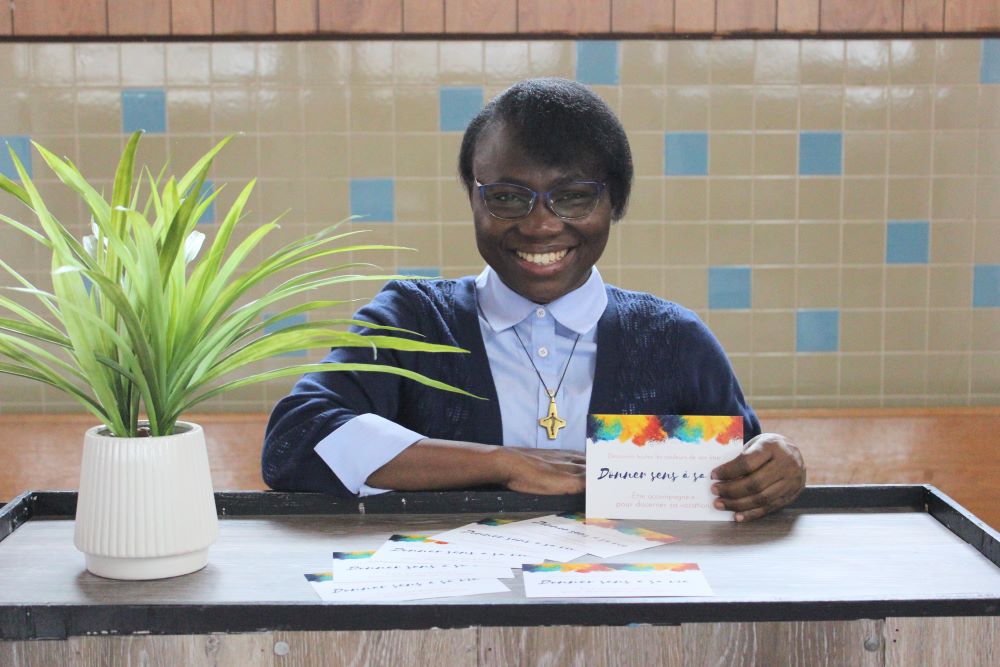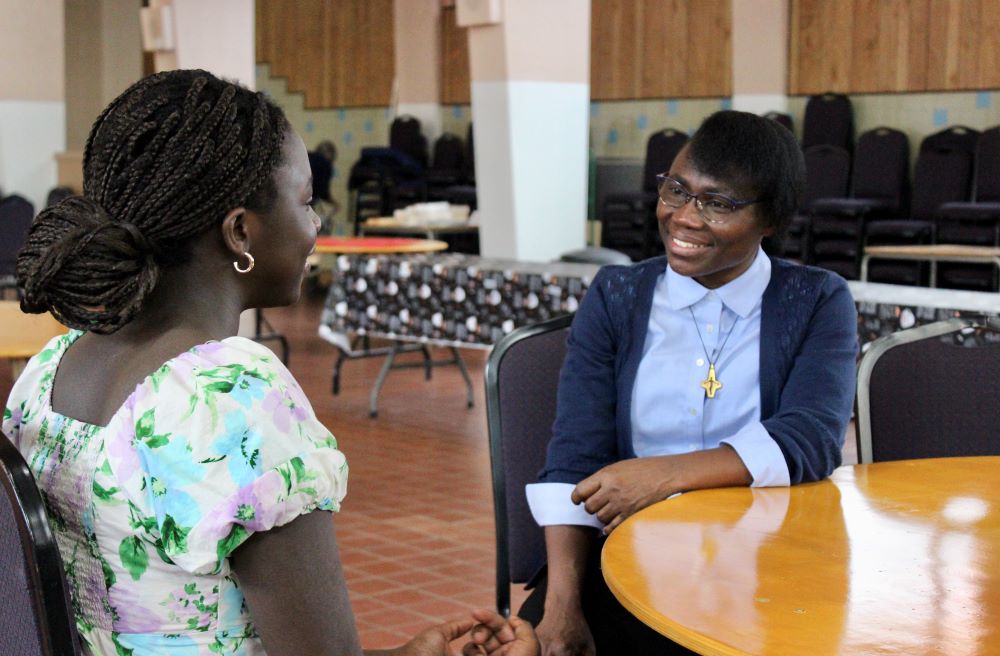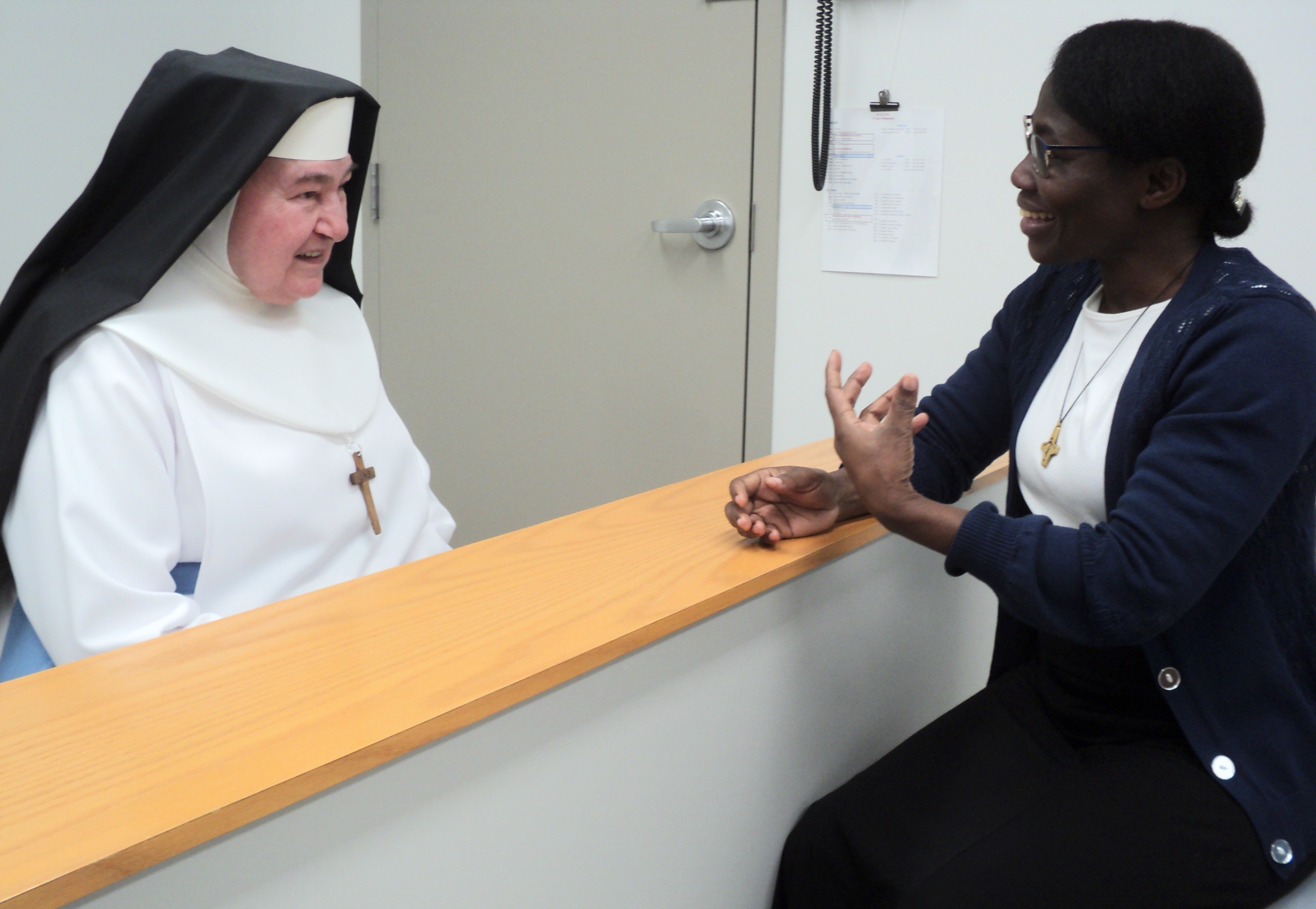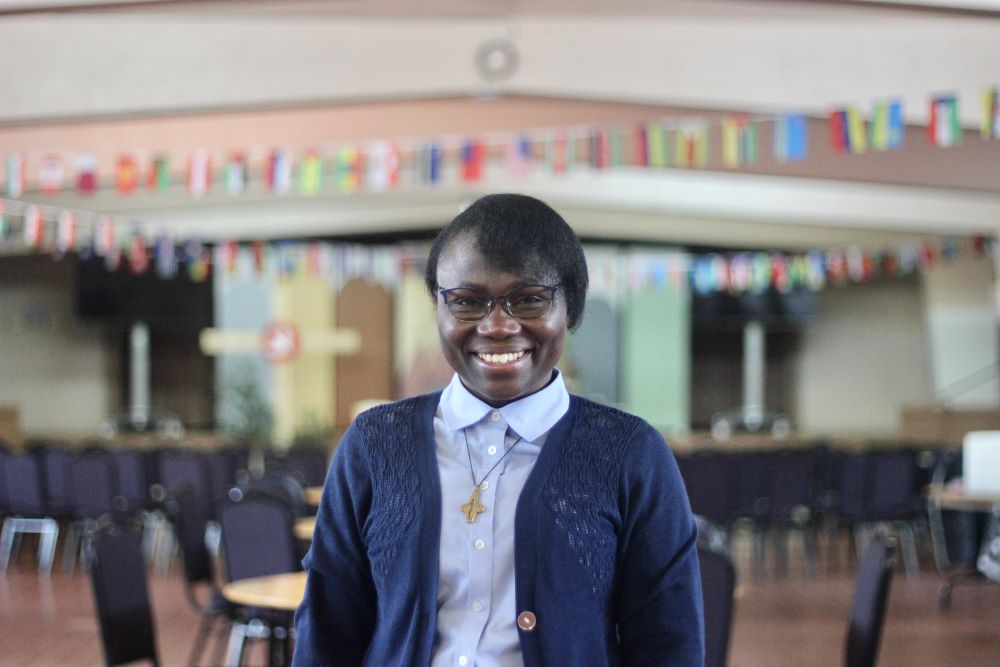
Sr. Joséphine Kimbolo distributes these colorful promotion cards to people she meets. (GSR photo/Joanna Kozakiewicz)
Sr. Joséphine Kimbolo, originally from the Democratic Republic of Congo, is a member of the "Les Soeurs de St.-Marie de Namur" congregation on a mission in Canada. She is part of an international apostolic religious community founded in Namur, Belgium, in 1819. They were founded in "the aftermath of the French Revolution, in the context of religious ignorance, as stated on their promotional cards.
The sisters work primarily in youth education, faith transmission and the alleviation of distress in all its forms. Their motto is: "In the simplicity of my heart, full of joy, I offered everything to God."
For over 20 years, Kimbolo's ministry has been to accompany everyone who crosses her path, helping them discover "all the colors of their soul" and find where God is calling them. Her approach has a "particular color," as she says.
GSR: How does your charism differ from what your religious community offers?
Kimbolo: It's not so much a difference, but a particular color that I bring. My religious community works primarily with young people to help them take charge of their lives. What's different about me is that I have a broader outlook. My mission is not just to accompany young people. Part of it is dedicated to young boys and girls, but another part is to those who are not so young anymore. I discern with each person what the Lord has for them so that they can discover and correspond to it as closely as possible. If a person crosses my path, we can make the journey together. It doesn't matter what age, sex, religion or nationality they are.
Before we talk more about vocation, can you define what a vocation is?
A vocation means to be called. Called to what? To live fully! Because for me, there's a being greater than myself, the one who created me. I believe he has a project of love for every person he has created. He calls me to be more myself, in fullness. It's up to me to discover what he's calling me to and realize God's project of love for me.

Sr. Joséphine Kimbolo with one of the young women she accompanies (GSR photo/Joanna Kozakiewicz)
Why are you so open to everyone, not just the young people approaching your community?
It's a root that goes way back. I'm discovering over time, when I look back at my personal history, that I received a legacy of universal love from my mother. My father, who was in business, was a manager in a shopping center and, at one point, said he was going to work for himself. He decided to move to the village. I was born when he was in the village managing his own business.
Life in the village was different for us. My mother was a woman who had a big influence on me. It was with her that I learned to go to church every Sunday. After church, when I was very young, even before the age of 5, we used to go from house to house with her, visiting the elderly and sick who hadn't been to church that day. She was very committed to the church and very jovial. We took the time to visit everyone and came home late. But it was all done in joy. That's where the roots of my vocation and openness came from and where the openness that benefits others today was born.
What is the defining characteristic of your particular mission?
The characteristic I discovered in my mission is to help others live a fulfilled life.
In my experience, if a person comes as close as possible to his or her deepest aspirations, no matter what he or she encounters in life, the person will stand tall.
I see this when I accompany people and help them connect to themselves and correspond to who they are so they can be true to themselves because that's where the secret of happiness and fulfillment is. I relate this to simplicity because simplicity is not being incoherent but being one.
If I talk to a young person who doesn't believe in God, I look at his human roots. To be one is to correspond, in truth, to who I am and live on the outside who I am on the inside according to the aspirations I have. That's the meaning I'm going to give to my life.
When you're attracted in all sorts of directions and living a double life, you're rarely happy. On the other hand, if you take the time to get closer to yourself, to who you really are, you know yourself and try to correspond to it as closely as possible. That's the source of joy.
For someone who believes in God, I approach them according to the meaning they give to their lives. If you believe in God, who has a project of love for you, then corresponding to his deepest aspirations for you gives your life meaning.
For a Christian, what is the meaning of life other than to correspond to God's project of love for them? That is authenticity and simplicity, to be one and the same.
Simplicity is the source of a fulfilled life.
Advertisement
How do you help people discover “all the colors of their being” as written on your promotional card?
I took this expression because of the colors. They're beautiful! A human being doesn't have just one aspect of themselves. They have many aspects and dimensions of their being. We have the human dimension, the spiritual dimension, the Christian dimension for those who believe in Christ, the social and intellectual dimension. ... All these dimensions are facets of our identity, of who we are. Discovering them little by little, one after the other unifies us. We return to simplicity and authenticity.
So, how do I help people discover their different colors in concrete terms? When I accompany a person, I enter into his or her story, which is sacred. You can't find them anywhere else but in their story, whatever it may be. Except that we ignore them. And that takes an outsider. I'm just a mirror, showing what the Lord's grace makes me see. I will show you what I see. Once you've seen it, you can decide what to do with it, but I only show you what I see. That's how I work. It's in the person's history, in the concrete experiences they've had since childhood. As I've discovered in my case, it all stems from childhood. It lets me know who I am because as the African proverb says, “the tree follows its roots”.
By working on their experiences, we'll discover the person's soul's tendencies when they were a child.
How much of your week do you devote to this mission? Is it something you offer full time?
I call it a mission, not a career. I often say that I'm a nurse by profession. I chose this path because I saw my mother taking care of people. It is a vocation for me. The Lord has given me this facility to learn a little more easily, and it's also one of the charisms he has given me. No matter what I do, this dimension of accompaniment is never far away. Presently, I'm in training at the IFHIM Institute, but also accompany several people, even in my spare time, every day and every evening. Those who are in Africa, I meet them virtually in the morning. But for those on the American continent, it's in the evening. I feel bad when I'm referred to by someone and I don't do anything about it. It's not full-time at the moment, but I'm happy to do it full-time whenever I can.
What kind of training are you currently doing at the IFHIM Institute?
The training is complementary training offered to anyone who already has a profession to qualify their work. We're looking at the person's vital human strengths. Everyone has strengths that are often dormant, but it's a question of seeing them and getting the person to see them. These are tools available to anyone, and you just have to have your own profession. There are lay people, missionaries, Canadians and people from other European countries who want to qualify their work. I took this course to complete my second year, but it doesn't give me an academic title, as it's a complementary course.

Sr. Joséphine Kimbolo accompanying another religious, Sister Cécile (Courtesy of Joséphine Kimbolo)
In the future, do you think you'll be able to do the accompaniment you're doing now in your spare time on a full-time basis?
Yes, in conversation with my provincial superior, I said everyone knows me for my two main strengths: caregiving and working with young people. I often bring young people to the elderly. Given the reality of this country, I can't work full time as a nurse because that would penalize my pastoral work, which is very important to me. So, we're working to get me to complete this training because they don't recognize my papers here. It's normal for me to work part time as a nurse, but I'd have to have a certificate in the field of accompaniment because it’s a law in Canada.
You've been doing this for more than 20 years. Have you noticed that more and more people need support in recent years?
Yes, it seems that as time moves forward, there is more need, and it's incredible. People need it, even people that I've accompanied in the past. When I come across them, sometimes I don't recognize them anymore because years have gone by and they don't need as much support, but I can meet with them briefly and wake them up a little, and they're back on their feet. There are a lot of cases like this. When I can't give all my time to those who contact me, I form a group on WhatsApp so that at least once a month, I try to reach everyone with a session.
Why do you think people need more guidance as the years pass?
I don't know if it’s because of evolution and modernity, but people are more distracted by everything, and there's less time to go within to find a point of reference to see what they want and what meaning they want to give to their lives. There isn't any, and everything is very superficial. All we think about is success. At the end of the day, we feel like an outsider because there's no life left. So, people become sad and depressed. There isn’t much time to be alone and intimate to see who we are. We're quickly called by the outside world, which solicits us more and more.
What does it mean to discover our deepest aspirations and to better correspond to them?
Looking at my example and understanding my sacred story since birth, I've seen a relation to the roots in my childhood. I enjoy inner freedom. You can ask me anything, but if you take that freedom away from me, I'm not going to be myself anymore, and you're not going to recognize me.
Likewise, when there is too much pressure, I can’t find myself. I long for freedom and like people to be free, too. I've just recently discovered through my sacred history that when my parents moved to a village, my dad had given us a lot of restrictions. We couldn't go out, we couldn't speak the village dialect, we couldn't play … and I was the only disciplined child, so I followed everything to the letter.
At the age of 3, when children played with others, I mostly stayed at home. There were comic books that I could look through with pictures. I also listened to the radio often, even if I didn’t understand everything. Therefore, I lived this solitary life when it was normal for a child to go out and meet others. I stayed indoors as if I were imprisoned. I didn't realize it at the time, but it affected the way I behaved, and until this day, I'm more of a self-didactic type, yet naturally an open and sociable woman.
I've noticed that inner freedom has characterized me, and that's where it comes from. This thirst that I aspire to comes from my personal history. Therefore, my wound became the source of a blessing for me.
I learned here at the IFHIM Institute that when you have a wound, you can put a blessing on that wound. I discovered that my source of freedom was born from this imprisonment, this psychological wound.
Now, several communities call me to come and teach their youth how to live freely.

Sr. Joséphine Kimbolo stands in the basement of her parish, St. Antoine-Marie Claret in Montreal, Canada, where she leads catechesis lessons on Sundays. (GSR photo/Joanna Kozakiewicz)
How is this different from the work of a psychologist?
I don't have a psychologist's degree; I make it clear that I'm not a psychologist. However, I am formed as a nurse. I also have a talent that the Lord gave me, I recognize it and everyone says it's a gift from the Lord. It's unbelievable how the Lord can use us. I've received this gift, and I speak of it openly.
If I accompany a Christian, I want to touch the meaning of his life concerning his faith. But if it's a non-Christian, I focus on their deeper aspirations and how to live in truth. That's how I differentiate myself. For me, it's very personalized. I start with the person, and what I do with one person isn't always the same with another.
But there are aspects of psychology involved. As a nurse, we also had rudimentary introductory courses in psychology, which helps me to distinguish people who come for help with psycho-somatic illnesses. My nursing profession helps me to do that. Therefore, there's a mix of talents the Lord has deposited in me that helps me.
Why do you think the support you offer and vocational discernment are important?
I've experienced it and see the difference it makes for young people. They become happy and fulfilled. They are no longer sad. It's not because they have more money, no. It's because they are connected to themselves.
Instead of living your life at 70%, you live it at 30% — what a difference that makes! If I approach God's love at 30%, that's on me. However, God offers 100% of his love. If I approach his love at 30%, I taste as little of it as possible. What if I approach 70% of his love? That's abundance, and he wants me to live to the fullest! 70% is here on earth, 100% would be in heaven!
What does a vocational accompaniment program look like for a senior person?
For me, vocation means responding to the call of Christ, who has a project of love for me. The Lord didn't establish this plan of love once and for all. Love is freedom. Love makes me grow in it progressively. Why should this project of love stop when I'm older? It doesn’t. God's plan of love is always there, even when I grow older. I have to discover it and live it. That's the joy of living! Even in old age. Because I'm answering this call. It's not just for the young, it's for all age groups. Because God’s love renews itself. That's the beauty of the Lord. He's never static, but dynamic.





